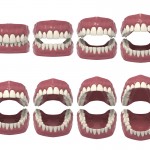
Studies have shown that edentate patients have poorer nutrition than those with no teeth The main aim of this study was to assess whether mandibular two-implant overdentures (IODs) improved the nutritional status of older people compared with those wearing a conventional denture (CD).
Patients over the age of 65 who had been edentate for a minimum of 5 years, had sufficient bone or placement of 2 implants in the anterior mandible were included. Those with systemic disease that contraindicated implant placement or a mini-mental state evaluation of 24 or less were excluded.
Participants randomized to the experimental group received a mandibular IOD on 2 implants with ball attachments in the canine region of the anterior mandible those in the control group received a complete CD. Three 24-hour dietary recalls were collected through telephone interviews at baseline and 12 months after prosthesis delivery
- 255 patients were randomised 128 received a CD, and 127 an IOD.
- At 12 months there were 114 in the CD group and 103 in the IOD group.
- No significant between-group differences were found for total dietary fibre (TDF), macro- and micronutrients, or energy consumed.
The authors concluded
Although there is much evidence supporting the adoption of two- implant mandibular overdenture (IOD) treatment as the standard of care for edentate patients, this evidence does not include an improvement in dietary intake at one year for medically healthy independent edentate elders when given no specific dietary counseling.
Funding:- This study was funded by the Canadian Institutes of Health Research (CIHR Industry Grant # UCR-36052) and Straumann Canada Ltd.
Comment
Other nutrition related outcomes (folate, B6,B12, CRP) from this study have been reported by this group previously and no differences were noted (see Dental Elf 1st Feb 2012)
Links
Hamdan NM, Gray-Donald K, Awad MA, Johnson-Down L, Wollin S, Feine JS. Do Implant Overdentures Improve Dietary Intake? A Randomized Clinical Trial. J Dent Res. 2013 Oct 24. [Epub ahead of print] PubMed PMID: 24158335.
